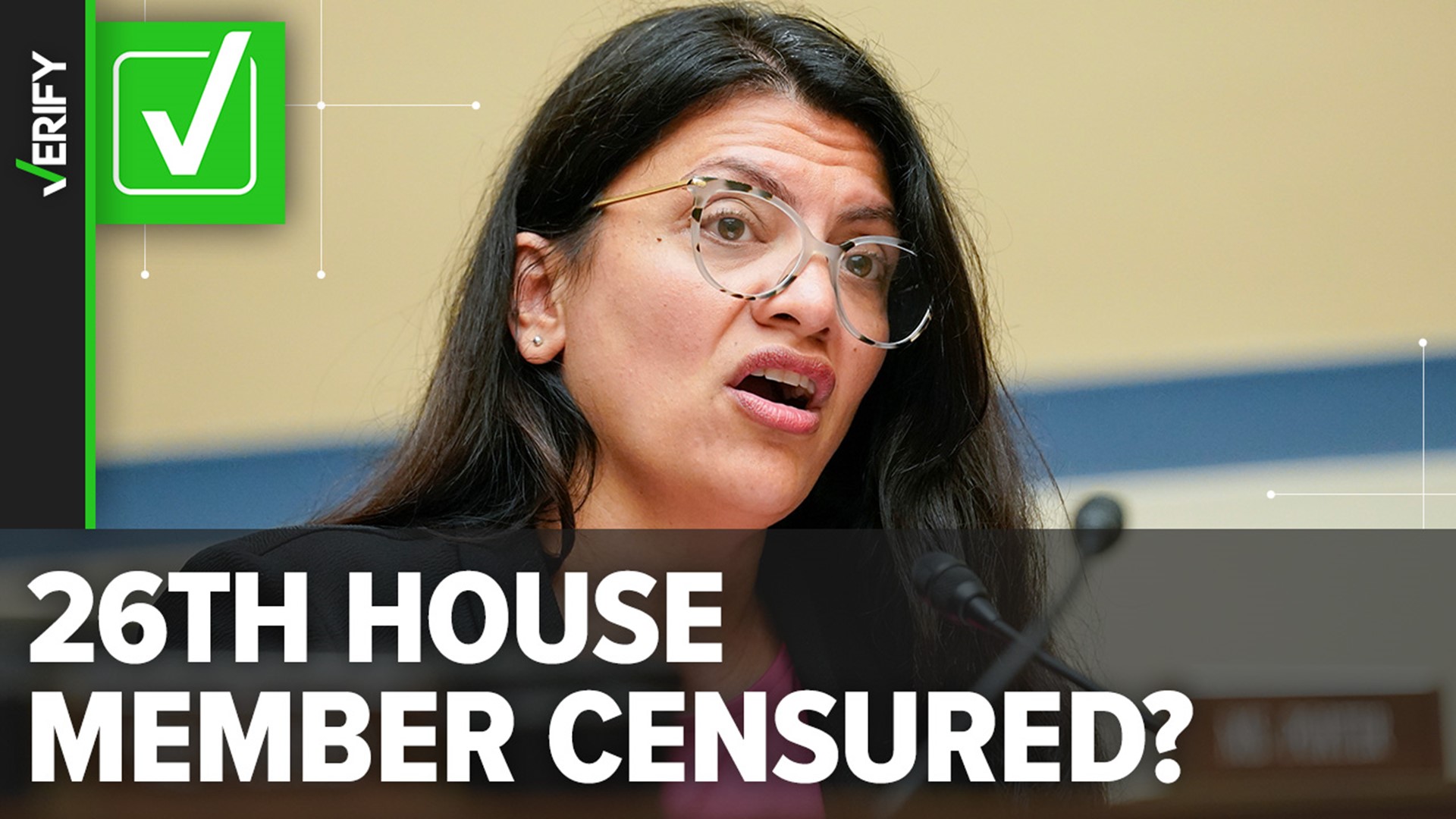The House of Representatives censured Rep. Rashida Tlaib (D-MI) on Nov. 7 for comments Tlaib, a Palestinian-American, made in regard to the Israel-Hamas conflict. The motion to censure Tlaib passed 234-188; 22 Democrats joined Republicans in supporting Tlaib’s censure while four Republicans voted against it.
Censure “registers the House’s deep disapproval of Member misconduct that, nevertheless, does not meet the threshold for expulsion,” the House says.
Some people on social media have claimed Tlaib is only the 26th member of the House to be censured in more than 200 years. One person on Reddit criticized the measure, saying “this isn't worthy of something that has only occurred 26 times in 200+ years” and wondered “whether censures really matter any longer.”
THE QUESTION
Has the House of Representatives only censured 26 members in its history?
THE SOURCES
- U.S. House of Representatives
- House Practice: A Guide to the Rules, Precedents and Procedures of the House
- U.S. Constitution
- Text of prior resolutions to censure a member of the House
- U.S. Senate
THE ANSWER
Yes, the House of Representatives has censured only 26 members in its history, which dates back to 1789.
WHAT WE FOUND
The House of Representatives says Rep. Rashida Tlaib (D-MI) is the 26th member of the House to be censured in its history.
While the U.S. Constitution says nothing about censuring a member of Congress, it does say both chambers may “punish its Members for disorderly Behaviour, and, with the Concurrence of two thirds, expel a Member.”
The House has three primary means through which it might punish its members. One is expulsion, as mentioned in the Constitution. The other two are reprimand and censure.
“Reprimand is appropriate for serious violations, censure is appropriate for more-serious violations, and expulsion of a Member is appropriate for the most serious violations,” says the House’s guide to the rules, precedents and procedures of the House.
Instead of expelling the punished member, censure is a tool the House uses as a form of “public rebuke.” The House rules do not impose any additional consequences of censure beyond a rebuke, however both the Republican conference and Democratic caucus have rules in place requiring the chair of a committee or subcommittee be replaced if censured.
The first time the House censured a member was in 1832, when it voted 93-44 to censure Rep. William Stanbery of Ohio for insulting Speaker of the House Andrew Stevenson of Virginia during floor debate, the House says.
The House can censure its members for any reason it deems worthy of the punishment. Past censures have been for reasons such as assaulting other members of Congress, selling military appointments, committing stock fraud, sexual misconduct with a House page and supporting the recognition of the Confederacy in a floor speech during the Civil War.
A total of 17 House members were censured between 1832 and 1890; 10 of those 17 were censured between 1864 and 1870, during the Civil War era. The House then only censured six members between 1890 and 2021.
Tlaib is the third representative to be censured since 2021 and the second to be censured this year.
The House censured Tlaib, a Palestinian-American with family in Palestine’s West Bank, in response to several comments she has made against Israel’s current military operation in Gaza, including her sharing of a video containing the phrase “from the river to the sea” to her social media account.
Tlaib and other proponents of the phrase, which is usually followed by “Palestine will be free” in protests, say it’s a call for the peaceful coexistence and freedom of all people in that area, while critics of the phrase say it's a call to destroy the state of Israel and its people.
In June 2023, Rep. Adam Schiff (D-Calif.) was censured “for misleading the American public and for conduct unbecoming of an elected Member of the House of Representatives” by a resolution that passed straight down party lines. All 213 votes to censure Schiff were Republicans, and all 209 votes to dismiss the motion to censure him were Democrats.
And in 2021, a resolution to censure Rep. Paul Gosar (R-AZ) for posting “a manipulated video on his social media accounts depicting himself killing Representative Alexandria Ocasio-Cortez and attacking President Joseph Biden” passed largely along party lines 223-207. All 221 Democrats plus two Republicans voted to censure Gosar, while 207 Republicans voted against censuring Gosar.
Censure is far less common in the U.S. Senate; the chamber has only censured nine senators in its history.












